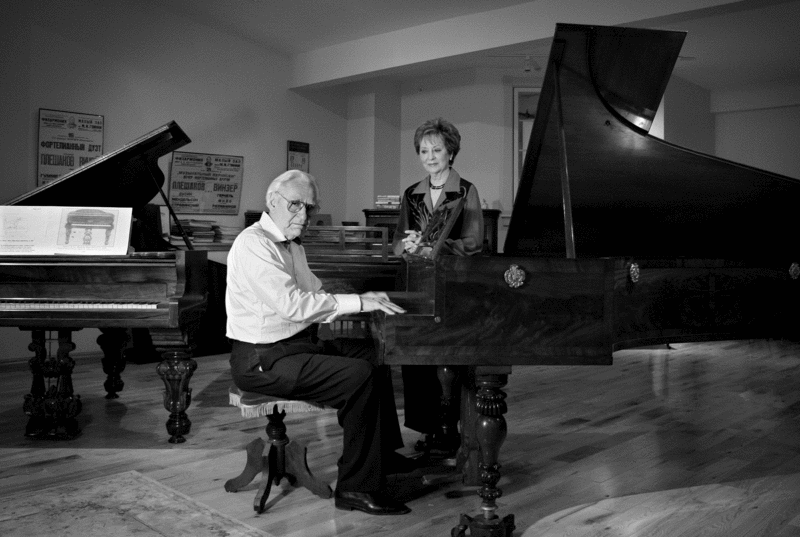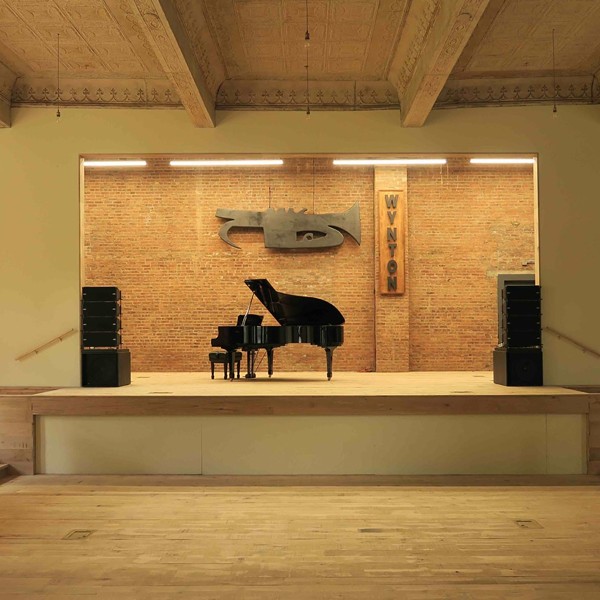
An afternoon in Hunter. A darkened vestibule. A closed door. There’s music on the other side. Faint, twinkling, beautiful. It’s Chopin’s fourth ballade. Turn the knob and push the door open, ever so delicately…
The sunny, white-walled, air-conditioned space is the size of a dance hall. This facility, however, is not one meant for dancing, but for listening and gazing, gazing at the dozens of breathtakingly gorgeous antique pianos that take up roughly two thirds of the room, their richly polished wood glinting in the light. Lining one long wall is a shelf holding hundreds of LPs and clothbound books; framed recital posters and a Baroque tapestry hang above tables filled with stacks of 19th-century music scores, their yellowed covers adorned with elaborately flourished, gold leaf lettering. At the opposite end of the long room sits a lone gray-haired man, his back to the door, playing one of the magnificent instruments. He glances back a couple of times but never lifts his hands from the keys, continuing to play for the next 15 minutes or so, until the supremely moving piece is completed. But when it does end, it ends too soon. One wishes the perfect scene could’ve just gone on forever. And if the player has his way, in some form it will. The pianist is Vladimir Pleshakov, and this is the museum that bears his name.
The Pleshakov Piano Museum’s first incarnation was as the Pleshakov Music Center, opened by the musician and his wife and fellow concert pianist Elena Winther in Hudson in 2002. But eventually, that city’s higher property taxes forced the couple to relocate, and they purchased a house in Jewett, reopening the museum in nearby Hunter’s Doctorow Center for the Arts in 2006. At the facility, Pleshakov and Winther teach master classes and present concerts and lectures.
But of course the real attraction is the museum’s collection of dozens of absolutely stunning antique pianos, organs, and harpsichords, many of which have been donated or loaned by collectors from around the world. Several of these highly ornate pieces date from as far back as the 1700s—and all of them have been fully restored to be completely playable; indeed, the couple frequently stages programs of period music using the appropriate instruments. As far as the museum’s staff knows, no other site in America has a remotely comparable collection of vintage keyboards.
“Each of these instruments is a living time machine,” says Pleshakov, his Russian accent still intact after decades in America. “They represent the true height of human endeavor, and they show what life and people and the composers and musicians were really like in their day.” He points to a 1789 Longman & Broaderip pianoforte, made when Mozart was composing. “The keys are so sensitive. You can pretty much blow on them and it will play,” he says, letting his fingers dance across the keyboard. “It sounds soft compared to a modern grand [piano], but in its day it was a very loud instrument, because everything else in the world was quieter then. So, of course, the violins and cellos of the chamber groups were softer too.” Nearby is the museum’s other crown jewel, an inlay-festooned 1826 Tichener, built for Russian royalty and acquired by the couple at a California estate sale years ago for “the price of an old jalopy.”
Pleshakov’s own story is at least as interesting as that of any of the museum’s artifacts. Born to Russian parents in Shanghai in 1934, he moved between the famously international city’s French, British, and Chinese sectors, learning the language and culture of each. “Shanghai was still the world capital of sin in those days, but I was too young to take advantage of it,” he says with a grin. His parents nurtured his interest in music with piano lessons, and after surviving the Japanese occupation during World War II, the family moved to Australia in 1949, where he debuted as the Syndey Symphony’s concert pianist at the age of 16. In the mid 1950s, the Pleshakovs immigrated to California, where the young musician enrolled at UC Berkeley. There he met and dated local native Winther, who had made her own debut at 18 with the San Francisco Symphony under the direction of Arthur Fiedler. The pair went their separate ways until meeting again in 1984 and marrying two years later. They lived in France and toured the world until 1999, when they became Hudson Valley residents.
Like most things in life, Winther says, the museum was never something the two had planned. “It just sort of materialized,” she explains. “We’d found the Tichener and had had it when we were in France, and then the others just started finding us. But people really seem to love the museum and want to see it continue. We actually had someone from the state call and ask us to apply for grants that we didn’t even know about to keep it open, if you can believe that.”
Throughout the summer, the museum has been presenting its “Piano: King of Instruments” concert series, which takes place in the Doctorow Center’s adjacent Weisberg Hall. “It’s a perfect situation for us because the stage is right next to the museum,” Pleshakov says. “We can literally just open a door and roll the pianos right onto the stage and then begin the concert.”
One of the series’ regular attendees, and an occasional performer at other museum concerts, is Michael Wedd, 16, who, along with his brother Patrick, 12, is also one of Pleshakov’s star students. “To be able to hear something by Mozart played on a Mozartean piano is just an incredible experience,” says Wedd. “It just adds something else entirely. Plus, [Pleshakov and Winther] are very good speakers; they make the subjects really interesting even to people who don’t know so much about music. And I can’t imagine anyone not being awestruck when they get to see the pianos. To see so many different periods represented in one place is unbelievable.” Along with such supporters as esteemed French pianist Lucien Geurinel, Wedd has contributed an essay to Pianos on the Mountain, a collection of writings about the museum and its founders due to be published this fall.
“It really is an amazing, important place,” says Albany-area pianist, musicologist, and instrument collector William Carragan, whose Civil War-era Steinway is currently housed at the site. “That people can just walk in—and even touch or play—so many fantastic, historic instruments is just incredible. I’m so glad it exists and that people can enjoy it.”
“There are several more instruments we’ve come across that are waiting to be restored and brought in,” says Pleshakov. “We really want and hope the museum will continue, and even keep growing, after Elena and I are gone.”
Anyone who pays a visit to this magical mountain sanctuary will certainly hope the same.
For the third installment of its “Piano: King of Instruments” concert series,” the Pleshakov Piano Museum will present “Russian Musical Treasures” on August 9 at 8pm in the Doctorow Center for the Arts’ Weisberg Hall. The museum itself is open by appointment. (518) 263-3333; www.catskillmtn.org.

















